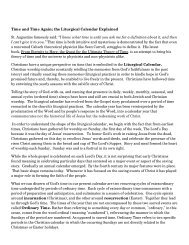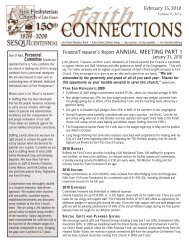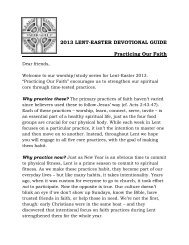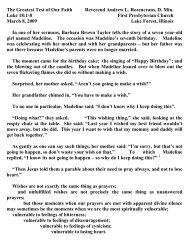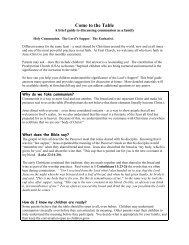Our Moral Compass: Purity - First Presbyterian Church of Lake Forest
Our Moral Compass: Purity - First Presbyterian Church of Lake Forest
Our Moral Compass: Purity - First Presbyterian Church of Lake Forest
Create successful ePaper yourself
Turn your PDF publications into a flip-book with our unique Google optimized e-Paper software.
“<strong>Our</strong> <strong>Moral</strong> <strong>Compass</strong>: <strong>Purity</strong>”Luke 7:36-50September 28, 2008The Rev. Christine Chakoian<strong>First</strong> <strong>Presbyterian</strong> <strong>Church</strong><strong>Lake</strong> <strong>Forest</strong>, Illinois“What makes people go wrong?” In 1971, psychologist Philip Zimbardostumbled into this question when he conducted the Stanford Prison Experiment.You may know about it: in a two week experiment designed to see how rookiesbecome “good cops,” half the Stanford students were arbitrarily assigned as prisonguards and half as inmates. The result was stunning: within one day – one day –the guards devolved into brutality and abuse, and the prisoners sank intoimmobilizing passivity. The degradation worsened with each day. It was abreathtaking transformation <strong>of</strong> normal, healthy students into something nearly lessthan human. They had to halt the study after less than a week.In the decades since this disturbing experiment, Zimbardo has dedicatedhimself to the study <strong>of</strong> how to strengthen moral good. In a recent book, TheLucifer Effect: Understanding How Good People Turn Evil, Zimbardo examinesnot only the Stanford Prison Experiment, but also the Rwandan massacres, the JimJones mass suicides, and the Abu Ghraib disaster. It is not light reading.But his question is crucially important. We all want to be good. So whatmakes people go wrong? Zimbardo reaches this conclusion: It is hard to be a“good apple” in a rotten barrel. Situational factors and systemic forces shape usmore than we like to think. And his work graphically reminds us that even if wedo pretty well in familiar situations where we know the rules and socialexpectations constrain us, it is exponentially harder to hang on to our “goodness”when we are thrown into unfamiliar territory: starting college, changing jobs,moving to a new place with its peculiar protocols. As he puts it, “The old youmight not work as expected when the ground rules change” (Philip Zimbardo, TheLucifer Effect (New York: Random House, 2007), p. 6).Imagine what happens when the ground rules are changing everywhere at once.These last few weeks I’ve made the case that this is exactly what’s going on withthe forces <strong>of</strong> globalization. Business leaders experienced globalization’s impactfirst, and now it is affecting every sector <strong>of</strong> life: what values guide our nationaldefense when we’re attacked by terrorists and not nation-states? What free-marketrules apply in a financial melt-down when the world depends on our economy andother countries own massive amounts <strong>of</strong> our debt? What are our core beliefs when
we’re no longer surrounded by a “WASP” society, but face a smorgasbord <strong>of</strong>faiths and ideas, some <strong>of</strong> which make a lot <strong>of</strong> sense to us? How do we keep on the“paths <strong>of</strong> righteousness” when the landscape is changing so fast? There’s onlyone way I know <strong>of</strong>: we need a Global Positioning System. And that, I believe, isjust what God provides us. In the next few weeks we’ll be learning how to readthe most basic part <strong>of</strong> our GPS: the compass, the moral compass, to help us findour way.Today we’ll set out to do two things: first, to get to know our moral compassbetter, and second, to explore one <strong>of</strong> its points in a little more depth.Now, the first thing we need to know about our moral compass is that it hasfive points, not four. Interestingly, for a long time social scientists only knewabout two points: fairness and not causing harm to others. But they began towonder whether this definition adequately captured the moral life. Now, pleaseforgive the graphic language that follows. By now I hope you know that I do notdo this gratuitously, but because I think it’s essential for the topic at hand. WhenUniversity <strong>of</strong> Virginia pr<strong>of</strong>essor Jonathan Haidt began studying morality andculture at University <strong>of</strong> Pennsylvania in the late 80s, he wondered:“If morality is about how we treat each other, then why did so many ancienttexts devote so much space to rules about [women’s menstrual cycles], whocan eat what, and who can have sex with whom? There is no rational orhealth-related way to explain these laws. (Why are grasshoppers kosher butmost locusts are not?) The emotion <strong>of</strong> disgust seemed to me like a morepromising explanatory principle. The book <strong>of</strong> Leviticus makes a lot moresense when you think <strong>of</strong> ancient lawgivers first sorting everything into twocategories: ‘disgusts me’ (gay male sex, …pigs, swarming insects) and‘disgusts me less’ (gay female sex, … cows, grasshoppers)”(http://www.edge.org/documents/archive/edge256.html).He calls it disgust; I call it simply the “ick” factor. Lo and behold: out <strong>of</strong> theresearch <strong>of</strong> Haidt, anthropologist Richard Shweder and others, a more completepicture <strong>of</strong> morality emerged. When you study cultures around the world and overtime, morality turns out to include not just how we treat each other (fairly andwithout harm) – morality also promotes group identity, social institutions, and a2
noble way <strong>of</strong> living. This larger view <strong>of</strong> morality means that we are indeed wiredfor fairness and not harming others – but we are also wired with instincts forcommunity, for authority, and for purity.3Now, it’s important to note that every culture interprets these valuesdifferently. And different cultures weight each <strong>of</strong> these instincts with the varyingimportance. Saudi Arabia, for example, weighs purity with much higher valuethan say, Denmark does. Within our own country, studies have shown thatconservatives place higher value on purity and authority higher than liberals do,and liberals place a higher value on fairness. But I want to make the case that nomatter where we land politically, all five points – fairness, not harming others,community, authority, and purity – all five points are important for our moralcompass.For the next five weeks we’ll hone our skills in using this essential tool. Fortoday, let’s move on to one <strong>of</strong> the compass points. We’ll start with the compasspoint <strong>of</strong> purity.We’re familiar with the story that we read today. A sinful woman comes into aPharisee’s home, bathes Jesus’ feet with her tears, dries them with her hair, and inthis act <strong>of</strong> contrition, silently begs for forgiveness. The Pharisee is disgusted:surely Jesus should know that this woman is sinful, that is, ritually impure,unclean, that is, in its most plain sense, “dirty.” And though the Scripture doesn’ttell us which particular sin, we can guess that it’s about sex. She might havecommitted adultery; she might be a prostitute; she might have run <strong>of</strong>f to marrysomeone her father didn’t choose for her. Whatever she’s done, everybody andtheir cousin know about it. She may as well have a scarlet letter pinned to herchest. And we recognize the Pharisee’s reaction: the universal reaction toimpurity: disgust, or “eww, ick.”Now, I don’t know about you, but my reaction to the Pharisee is pretty muchdisgust in return. He is sanctimonious, judgmental, and closed-minded, right?Who is he to get on his high horse and judge? Who is he to condemn this unnamedwoman, likely a victim <strong>of</strong> patriarchal society? Who is he to decide that thiswoman’s behavior is sinful? I leap to root for Jesus who saves this innocentwoman, unjustly condemned.
and when are we just being biased? Now, the easy and most obvious answer isthat we find our answers in the Holy Scripture. But from our recently concludedyear-long study <strong>of</strong> the Bible, you should also know that Scripture isn’t a cookbook– it’s a conversation. If we go to Leviticus, we’ll be told purity includes avoidingshellfish; if we turn to the gospels, we’ll find that purity precludes divorce; if weread the letters <strong>of</strong> Paul, we’re told that purity requires women to wear veils on theirheads. (Yes, it’s in there: check out I Corinthians 11.) There is no “literal” reading<strong>of</strong> purity in the Bible. So what are we to do? Close the book and call it a day?Arbitrarily pick and choose from the Bible’s myriad purity laws and virtue lists? Idon’t think so. No, this is what we need to do: look carefully at the Bible’s ownconversation within itself to find our way. And Jesus gives us a clue in theScripture passage that we read today.When the sinful woman comes in humility, weeping and washing his feet withher tears, Jesus does not condemn her. He does not resist being touched by her,even though the encounter will render him ritually impure and socially suspect.Instead, Jesus receives her. Why? Because in Jesus’ book, bodily purity is not anend in itself: it is an expression <strong>of</strong> the larger good <strong>of</strong> purity <strong>of</strong> heart. He isfollowing the “Great Commandment”: “You shall love the Lord your God with allyour heart and soul and mind and strength, and you shall love your neighbor asyourself.”This is the guideline, then, by which Jesus is measuring pure and holybehavior. The woman has humbled herself, has thrown herself at Jesus’ feet, andby doing so has shown her heart’s desire to love the Lord her God. This is realpurity. The Pharisee may have the checklist <strong>of</strong> rules down pat … but he knowsnothing <strong>of</strong> real holiness.It’s so important for us to be clear about this: when Jesus receives the sinfulwoman but reprimands the pious Pharisee, it isn’t because purity doesn’t matter, orbecause sanctity is passé, or because there is nothing for the woman to feelashamed about. “Shallow are the souls that have forgotten how to shudder.” No,Jesus reprimands the Pharisee because the Pharisee is shuddering about the wrongthings. <strong>Purity</strong> matters … but the purity God seeks begins with the aspirations <strong>of</strong>our heart: humility and gratitude to God, kindness and forgiveness toward others.5
And when we grasp that, the direction <strong>of</strong> our moral compass becomes much,much clearer.6Before I close, let’s test this with three brief real-life examples. The first is aconversation I had a couple <strong>of</strong> weeks ago in Beirut with a pr<strong>of</strong>essor at a Lebaneseuniversity. I was telling her how impressed I was with the freedom women enjoyin her country. She agreed, but with a caveat. Men still believe that their honor islinked to the purity <strong>of</strong> the women in their households. In fact, husbands can stillkill their wives with impunity if they believe their wife has committed adultery.You can imagine the courage it takes when this pr<strong>of</strong>essor questions the relationship<strong>of</strong> a man’s honor to his female relatives’ sexual behavior. Please forgive again thisgraphic imagery, but this is what she tells her male students: “Your honor is notfound in your sister’s or mother’s or wife’s [reproductive parts].” Your honor isfound in the love you show your family and household; your honor is found inyour own integrity.The second is an Op Ed piece I read recently in the Wall Street Journal. Itdescribed the pressure college women receive to engage in risky drinking andsexually promiscuous behavior. In a perverse twist <strong>of</strong> feminism, it is other collegewomen who are egging them on. The girls who resist the pressure are ostracized… and the girls who give in are gossiped about (Ashley Samelson, “LipstickJungle,” The Wall Street Journal, Friday, 9/26/08, W11). It is one sick system.What’s happened here? Licentiousness is masquerading as equality. But as theapostle Paul once said, “Just because something is lawful doesn’t mean it is good.”The issue <strong>of</strong> purity here isn’t about a double standard for young men and women.It is a question <strong>of</strong> whether behavior is edifying or demeaning… whether themotives are the upbuilding or the cheapening <strong>of</strong> one’s body, one’s self. This is realpurity: behavior that exhibits genuine love.The third and final incident happened decades ago – before I was born. In theheat <strong>of</strong> the Cold War, you will recall, Joseph McCarthy had made it his mission toroot out all communist impurities from the United States. The McCarthy hearingsinfamously ruined the lives <strong>of</strong> scores <strong>of</strong> men and women across the country.Finally, with yet another young man’s career and reputation on the line, on June 9,1954, the Army’s attorney, Joseph Welch, stood up to Joe McCarthy: “Until thismoment, Senator, I think I never gauged your cruelty or recklessness....” When



